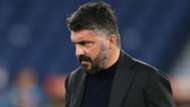Contained within Luciano Spalletti’s effusive praise of the Nigerian was an observation that could make all the difference in the coming season
If Saturday’s swift brace in the 3-0 friendly win over Bayern Munich did anything, it drove home the sense of something truly monumental looming for Victor Osimhen.
The 2021/22 Serie A season will see the centre-forward enter the most important phase of his fledgling career, and that in more ways than one.
His decision to join Napoli last summer, off the back of an impressive debut season with French side LOSC Lille, for an eye-watering outlay believed to be a record for an African transfer was greeted with an initial wave of optimism.
It is a mark of modern football’s obsession with transfers that status is bestowed on the basis of the size of the fee paid; for many, a move of that magnitude immediately shot the 22-year-old into a higher tier.
What followed in the first year – a rash of injuries, inconsistency and a bout with Covid – brought to light just how much rarefied the air is at a higher level.
The season-long uncertainty around Gennaro Gattuso did little to help, and the shot-happy nature of the rest of the Napoli attack also meant he struggled for service. Beyond his own adaptation to Italian football, his team also needed to adapt to him.

Enter Luciano Spalletti, a coach who throughout his career has made a habit of bringing the best out of strikers.
While his profile – he has managed Internazionale and AS Roma, two of the biggest sides in Italy – made him an attractive hire anyway for club president Aurelio De Laurentiis, his work with the likes of Edin Dzeko and Mauro Icardi will almost certainly have been a factor in his favour.
Napoli’s European ambitions may be well-established by this point, but taking punts on expensive targets is not the club’s modus operandi – when they spend big, it has to come good.
It would not be farfetched then to consider the blossoming of Osimhen one of Spalletti’s KPIs at San Paolo, and already the 62-year-old has knuckled down to the responsibility.
So far in preseason, the Nigeria international has been prolific, hitting seven in three matches to signal his intent ahead of the new season. However, the biggest indication of what is around the corner came in the wake of Spalletti’s comments following the slim friendly victory over Pro Vercelli.

After the former Lille marksman scored the game’s only goal, his manager told Napoli’s official website: “Osimhen is a striker who has the ability to transform every ball that comes his way into chances.
“He is a generous player who runs a lot and every now and then this intense running can cause him [to make] some mistakes, but he is an important player, complete, and we aim a lot on him.”
Aside from revealing Spalletti subscribes to the ‘compliment sandwich’ system of feedback, that brief (but nevertheless insight-laden) statement pinpointed perhaps the single biggest alteration the Italian manager intends to make to Osimhen’s game.
Will Victor Osimhen’s Napoli mount a Serie A title challenge this season?
— Goal Africa (@GoalAfrica) August 1, 2021
For elite-level strikers, a vital factor in front of goal is calmness.
This breeds clarity: that ability to quickly – almost subconsciously – cycle through an infinite number of solutions and emerge with the right one separates the good from the great, and will often prove the difference in tight situations.
While a fine finisher in his own right, Osimhen does get through his fair share of misses. Every striker does, of course; the argument is not that Napoli’s n.9 misses more than everyone else. The nature of a lot of those misses, though, is suggestive – they are often instances of his technique letting him down in a split second, a phenomenon Spalletti has linked to the player’s all-action, bustling style.

Osimhen’s work rate and willingness to chase every lost cause is arguably part of his appeal, and is part of what makes him such an exemplary attacking spearhead.
Take that away completely, and he would not be anywhere near as effective leading the line. However, the trade-off is sometimes that, by the time he arrives in goalscoring areas, he is too frantic to reap the reward of his selfless running. It is necessary then to find a balance.
In his previous jobs, Spalletti built systems that de-emphasized the need for the attackers to drop all the way back in defensive scenarios.
Not only did it allow the difference-makers to remain in prime positions following turnovers, it also reduced the amount of running they had to do in order to make up ground to the final third in attacking transition.
It may seem counterintuitive to suggest a footballer can improve by running less.

However, players like Zlatan Ibrahimovic and Lionel Messi have made careers out of conserving energy by picking their moments, and while they represent extremes, there is a lesson there for Osimhen.
Letting a player do all they can is, contrary to popular belief, not the best way to improve their base level; the key to truly inhabiting the stratum his transfer fee has placed him may lie in streamlining his game.
Against Bayern, he was noticeably less gung-ho in his exertions, but his pair of finishes were an ode to the economy of movement that his manager advocates.
In the end, Spalletti’s sage observation could prove the making of Osimhen.









